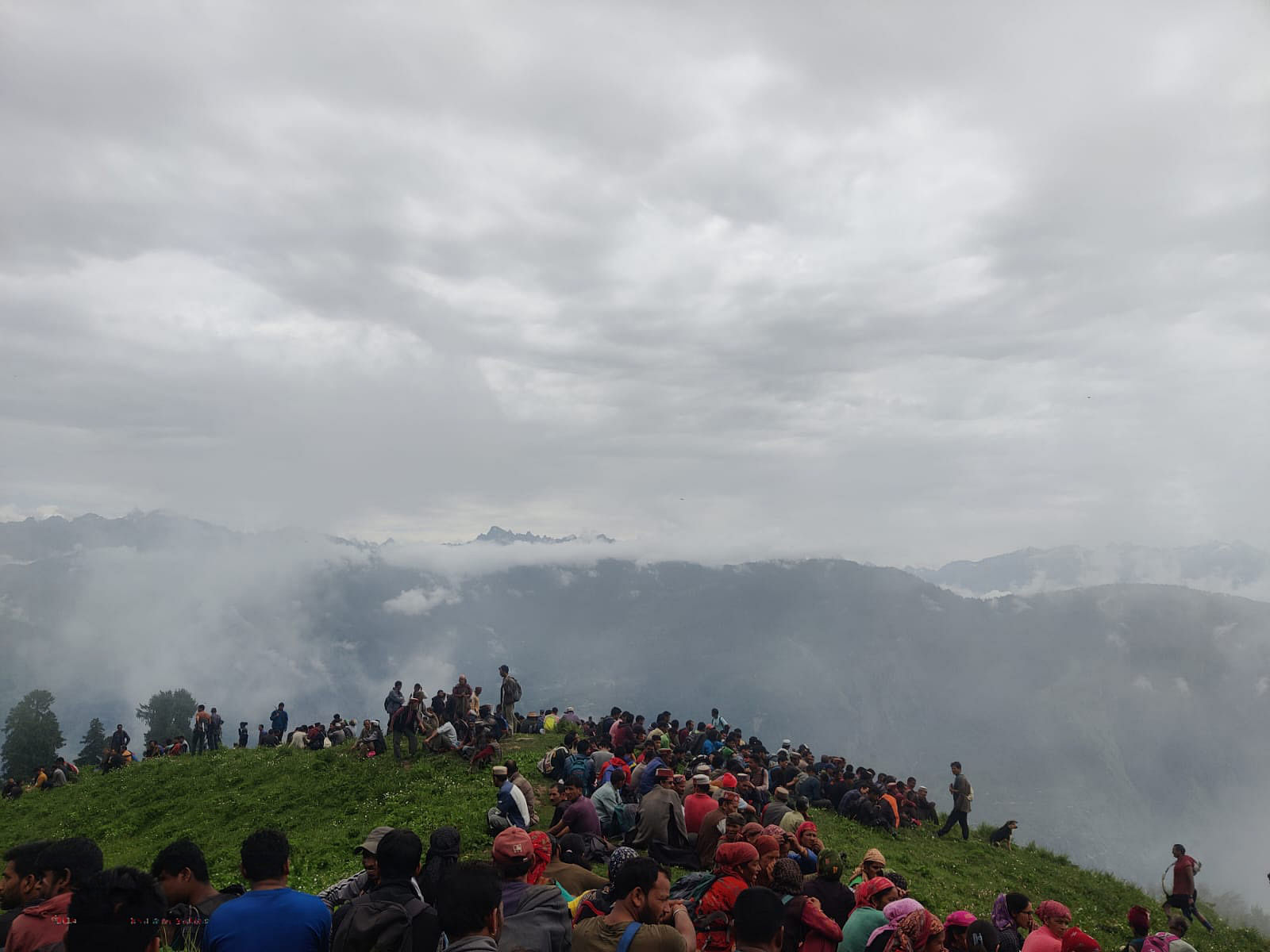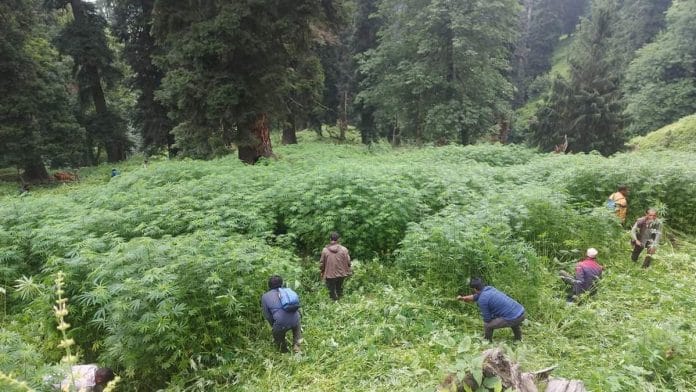Shimla: On 25 July, a local deity in Himachal Pradesh’s Kullu, a district notorious for drug trafficking, “offered” a peculiar solution to a group of villagers who knocked on her temple’s doors, desperate for rain in a time of prolonged drought. The problem, it appears, was a vast swathe of cannabis plants blossoming in the district’s Kothi Sari valley, and destroying them, the answer to their grievance.
Armed with sickles, and ‘divine intervention’, residents of over 25 villages dotting this valley — including Nathan, Banogi, Nalhach and Jindore — got to work. Within the course of two days, they destroyed cannabis plants spread across 60 bighas (15 hectares) of forest land surrounded by “barbed wire”. Videos show them hacking away at the lush plantations, some even uprooting the cannabis plants with their bare hands — on the “instructions” of their goddess, ‘Mata Bhekhli’.
Elaborating on the goddess’s ‘dictum’, Rattan Lal, a resident of Nathan village, told ThePrint, “Weather has been playing spoilsport for the last few years, but this time, the prolonged dry spell hit us hard. We decided to seek divine intervention and approached Mata Bhekhli.”
Residents of the Kothi Sari region are ardent worshippers of the deity.
The villagers went to the temple, seeking courage to brave the prolonged dry spell. But when asked for rain, the goddess, they said, “raised concerns” about some activities in the local forest, including cannabis cultivation and locals leaving their cattle on the streets.
Rakesh Sharma, a priest who performs puja at the deity’s temple, said, “The goddess said unwanted things are being planted in the forest, and iron tools are being used to dig up forest land. She also said cattle are being deserted by locals.”
Other deities too had “expressed their displeasure”, he said. “Sari Narayan, Kashyap Narayan Banogi, Ganpati Narayan Nalach, Jeev Narayan Nathan, Baba Bir Nath Shaktidhar and Balhoni also ordered to stop such activities in the forest areas.”
A state government official told ThePrint that more than 1,500 villagers gathered in the forest to uproot the cannabis plants. “Neither the district administration nor the forest department was informed about it.”
The ‘divine operation’ has put the forest department in an uncomfortable spotlight. “This has raised fingers at the forest department as to how cannabis was being grown in the forest, that too in such a big volume,” said the government official.

The irony that this is happening in Kullu, is not lost on the authorities. Another senior government official ThePrint contacted even said, “This is a step worth hailing. However, we will comment on it after gathering proper information.”
Kullu is infamous for cannabis cultivation, with a small village in the region, Malana, considered a cannabis republic on its own. ‘Malana Cream’, a form of hashish (also known as marijuana, ‘charas’ or ‘hash’), comes from this area, and is one of the most sought-after forms of the recreational drug, which is trafficked to various parts of the country.
Cultivation of cannabis is illegal in Himachal. However, a committee appointed by the state government in the April 2023 budget session had in September that year recommended regulated cultivation of cannabis for medicinal and industrial purposes.
According to the 2023 report of the Narcotics Control Bureau, Himachal, besides Odisha, is where cannabis trafficking takes place in “substantial quantities” and the drugs are then sold in Maharashtra, Rajasthan, Goa, Gujarat and other metro towns of India. Kullu is a hotbed of illegal cannabis cultivation, the report further states.
Contacted by ThePrint, Himachal Pradesh Director General of Police (DGP) Atul Verma said that under the Narcotic Drugs and Psychotropic Substances (NDPS) Act, 42 percent more cases were registered in Himachal in 2023 as compared to the previous year.
“A total of 2,147 cases were registered in 2023, while 1,517 cases had been registered in 2022,” he added.
Meanwhile, Kullu Deputy Commissioner Torul Ravish said: “Civil society acting against drug addiction is a welcoming step. We also conduct such drives. It is not possible without the help of local residents.”
‘Cannabis being grown in fenced plots’
Asked about the villagers’ quest, Kothi Sari panchayat Pradhan Heera Mani told ThePrint, “People were surprised to see the cannabis plantation in the forest. There were several plots where cannabis was grown. The forest area was fenced with barbed wire by the forest department.”
Another resident of Kothi Sari village, Rohit Thakur said, “We saw many fenced plots. Locals rarely go to that side but it seems the cannabis was manually grown.”

Some villagers also asked whether the police and forest department were aware of these plantations. “How could cannabis be grown in the forest on such a large area, that too without the connivance of the police and forest department? Villagers cannot cut a shrub in the jungle without facing action from the forest department but here proper cultivation of cannabis is being done,” said Thakur.
‘Flower power’ to ‘turbo diesel’
In May this year, the Solan police had reportedly seized 36 kg of charas, worth around Rs 5 crore in the international market, during a raid in Kullu district, arguably one of the largest seizures by police in recent years.
Over the years, the state government has undertaken various drives to curb the trafficking of cannabis as well as poppy plants (used to produce opium), including destruction of these plants by enforcement agencies, from time to time. A state government official told ThePrint that more than 20 lakh cannabis plants have been destroyed in the last two years across the state.
“It is shocking to see the variety and growth of cannabis plants. Several areas of Kullu have hybrid cannabis plants. Government is containing its cultivation but it can’t be done without the locals’ help,” he added.
An official involved in the drug de-addiction drive in the state told ThePrint that high quality marijuana is being grown in Kullu district as its seeds have been crossbred with other varieties. “Such varieties have high resin content and the product is sold under different names including easy girl, flower power, morning california, turbo diesel,” he added.
Hemp and marijuana are two different names for cannabis. Hemp has less of the psychoactive component called tetrahydrocannabinol (THC), while cannabis has more. While cannabis is used as a recreational drug, hemp is used in commercial and industrial products.
A senior state police officer said, “Hybrid hemp is cultivated in the parts of Kullu district. Charas produced here has its market in Scandinavian, eastern European countries.”
(Edited by Gitanjali Das)
Also Read: Scientists find cannabis won’t make you ‘lazy & unmotivated’, but it can make you less reliable






